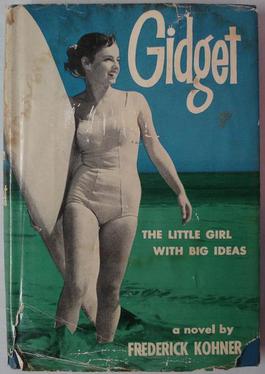Malibu Bubbe: The Real Gidget
Before the Beach Boys, before Frankie and Annette, there was Gidget

Graphic by Angelie Zaslavsky
Before the Beach Boys, before Frankie and Annette, there was Gidget, the spunky girl surfer who sparked a national obsession with beach culture. But Gidget was neither Sandra Dee, who played her in the 1959 film, nor Sally Field, who played the role on the television series that ran from 1965 to 1966. The real Gidget — on whose diaries the best-selling book, the hit movies and a TV series were based — is Kathy Kohner Zuckerman, the daughter of Czech Jews who fled Europe during the rise of Nazism. She is the descendant of kohanim. And her middle name, Klara, honors her great aunt, who died in the gas chambers.
Now, 50 years after her father wrote the eponymous novel, Zuckerman still answers to Gidget (a combination of girl and midget) and chats up such surfing icons as Laird Hamilton at the Malibu Pier. But she gave up her long board years ago, and traded Moondoggie (her fabled teenage love interest) for Marvin Zuckerman, a Yiddish scholar and author, and her husband of 43 years.
The real-life Gidget spoke to the Forward about her Jewish childhood in Brentwood, Calif., as the younger of Frederick Kohner and Fritzie Klein’s two daughters.
“I had a very secular upbringing,” she said. “My parents spoke German at home and used to call me Katzie (Cut-zee), for kitten or cat. I had Christmas trees and Easter egg hunts. I don’t really know why; I suppose their gang, the émigrés, wanted to blend in here and feel like everyone else.”
Her father, a screenwriter, had earned an Academy Award nomination for the 1938 film “Mad About Music,” and in 1954 he relocated the family to Berlin to work on a movie. Zuckerman was 13.
“Back in the day, I didn’t know what a bat mitzvah was,” she said. “And I didn’t have this angst about living in Berlin. The topic of the horrors was not brought to my attention, particularly.”
In 1955, Zuckerman returned to Los Angeles feeling worldly. She found that she couldn’t relate to her peers, and so her mother recommended she go to the beach Saturdays. It was on one of these outings that an acquaintance took her out for her first ride on a surfboard.
“It was June 24, 1956 — it’s in my diary pages. They called me Gidget. And I felt like, ha! I got a name! I’m one of them!”
The teenage Zuckerman wanted to write down her experiences; when she mentioned the idea to her father, he decided that her story was worthy of a book. He wrote “Gidget” in six weeks.
It was his first novel, but his older brother, Paul — a Hollywood agent whose clients included Ingmar Bergman and Ernest Hemingway — didn’t like it and reportedly refused to market it to publishing houses. In the end, it sold 500,000 copies and was even translated into Hebrew.
It was re-released in 2001 and is now in its 10th printing.
“The book is a work of fiction, but the core was there,” Zuckerman said. “I was called Gidget. I was the only girl. It’s a story of surfing. It is also a story of falling in love, and I really did. I was mad for this surfer named Bill Jensen. Mad! He was the alleged Moondoggie.”
As in the book, Zuckerman brought food for the guys . “That’s where my Jewishness came out, I suppose,” she said. But being Jewish was never an issue. “It never came up really. It was like we forgot about everything and went surfing.”
But life changed in college. While dating a fraternity boy at Oregon State, he told her he didn’t think they could get pinned because he didn’t know if she’d “fit into the Portland community” because she was Jewish. It was in also college that Zuckerman joined Hillel, and loved it.
In 1960, one year after the “Gidget” movie came out, Zuckerman returned to the beach. “Everybody east of the 405 freeway decided they were going to come to Malibu and find their Moondoggie,” she said. Yet it felt empty. While she had been away, her surf pals had entered the Army, married or moved.
Zuckerman stopped surfing, but she still had fun.
She married Marvin Zuckerman of the Bronx, whose parents were members of the Workmen’s Circle/Arbeter Ring and of the Bund. He was nonreligious but culturally Jewish; his first language was Yiddish.
“He taught me a lot,” Zuckerman said. “On one of our first dates, we went to the Warsaw Ghetto Uprising memorial. I didn’t know what that was.”
Yet he didn’t have a clue about pop culture. When she revealed she was Gidget, he said, “What’s that?”
The Zuckermans have two sons, David, 41, and Phil, 37. Both were bar mitzvahed, and Phil is raising the couple’s three grandchildren Jewish.
Today, Zuckerman continues to do book signings and to regale groups with tales from “the ‘Bu.” And by doing these things, Surfer magazine’s number seven all-time most influential person fulfills one of the Ten Commandments.
“You know, at the Jewish Home for the Aging in L.A., there’s a plaque that says ‘Honor Thy Father and Mother.’ Sure, I was his muse, but
I’m honoring my father by getting up and talking about his novel.”
Aimee Berg is a writer living in New York.
















